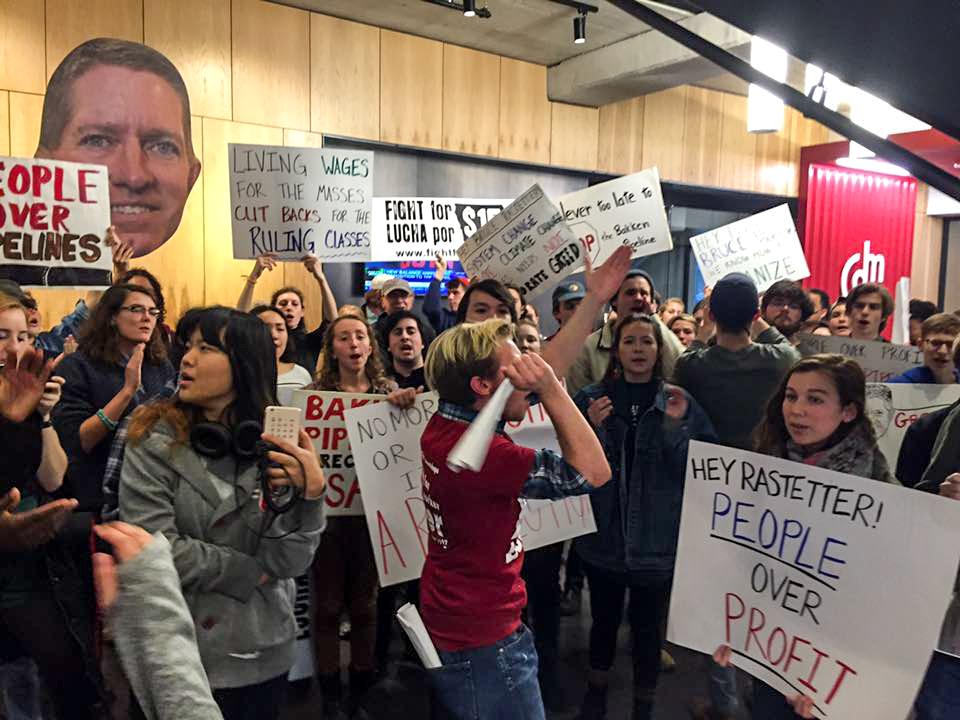By Steve Yang
yangstev17@grinnell.edu
On Friday, Nov. 11, Grinnell College Student Action (GCSA) led a group of over 60 Grinnell students to Des Moines to protest at the office of Cultivation Corridor, where Bruce Rastetter, the sitting president of the Board of Regents that overlooks Iowa’s public universities, also has a seat on the company’s Board. The group’s student letter demanded a 15-dollar minimum wage, a water cleanup program paid for by corporate polluters and the shutdown of the Dakota Access Oil Pipeline. GCSA garnered significant media attention with their activism, including a feature in the Des Moines Register and a substantial number of engagements on social media.
The organizers sought to guide confused and frustrated students towards concrete action against a man they expect to make the short list for Secretary of Agriculture in the incoming White House Cabinet. Molly Kraus-Steinmetz ’17 said that while she felt Trump’s election was detrimental for GCSA’s goals, it wouldn’t stop the group from pushing forward and advocating for its aims.
“In some ways, this was born out of a desire to give people a chance to actually act, to move forward,” Kraus-Steinmetz said. “With Trump, that creates a much more hostile climate for things that GCSA wants to have happen. We are determined not to play defense … and see direct action as a good way to get involved. We want to show students a way to make a difference.”

A student in GCSA presented a letter to Jay Byers, one of Ratsetter’s fellow Board-members on the Board of Regents. The letter stated that the group’s protest was primarily based on Rastetter’s funding of “corporate demagogues like Donald Trump, [which] is fundamentally at odds with our needs and the needs of our community.” Students in GCSA worked with Iowa Citizens for Community Improvement to identify Rastetter as a target for protest.
“This let [Rastetter] know what we’re about,” she said. “This built a base for GCSA to continue doing this kind of work. At our meetings, we have everyone share a word to describe how they are feeling, and people said they felt pumped, exhilarated and empowered.” Kraus-Steinmetz says that GCSA will continue to push Rastetter for a meeting.
The protest was organized after GCSA held an emergency meeting on Wednesday evening, which required numerous subgroups to take action quickly to cover issues related to recruitment, travel logistics and safety. Some students were assigned as press and police liaisons, while others provided social media support, led chants and gave speeches.
“Everyone is involved in some level … because there’s a lot of work that goes into putting together something like this,” said Sayles Kasten ’19, a press liaison for the group. “We need to make sure we can do this safely and effectively. There are also people in charge of turnout and making sure it would be a good action.”
Kasten, Nyx Hauth ’19 and Langston Thomas ’20 wanted to emphasize that the Rastetter protest will be only one type of event that GCSA will hold, along with a schedule of events protesting for divestment from fossil fuels and a 15-dollar minimum wage on Grinnell’s campus.
“We are part of a national organization with a base of a million people in 30 states, which is a huge advantage. We can build that action across our chapters,” Hauth said, adding that their training is conducted by People’s Action, which encompasses Student Action and GCSA. “We still need the same things that we needed before Trump was elected. We’re fighting the same fights.”
Thomas said that he hopes to see more participation and involvement, particularly at Saturday meetings at 4 p.m. He noted that at the next meeting, protests will be planned for aims like making a living wage, and a space provided to foster discussion about how to make physical change.
“A lot of people have a lot of emotions. People have a desire to do something about it. Knowing that there is power in numbers, future protests, … if [students] really feel strongly about the outcome of the election, then sometimes you have to do more than make a post on Facebook,” Thomas said. “You have to translate it into action. It’s a great way to productively turn that emotion into action with students who care about those issues.”
“All they have to do is reach out,” Hauth added.



































































